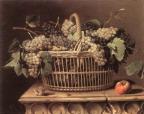We had a good harvest. But today's Gospel lesson is about a hijacked harvest.
Jesus -- certainly with Isaiah's image of the unfruitful vineyard, in chapter 5 of that book, in mind -- tells a parable about an absentee-landlord vineyard owner faced with renegade tenants who won't hand over the harvest -- not to the owner's slaves, who wind up killed or beaten up; not even to the owner's own son, whom the tenants kill, the better to lay claim to the vineyard.
When we read this story today, we tend to focus on the narrative as Jesus' indictment of the religious leaders of his day, who don't recognize the religious establishment's complicity in the murder of the prophets that they now lionize, and his self-identification as God's son, sent to claim God's vineyard but facing the same fate as the prophets who went before him. What we don't pay too much attention to in Jesus' story is the harvest itself; that which the vineyard owner considered so important.
What is it that we Lutherans usually pray when we bring our weekly gifts up to the altar every Sunday? "We offer with joy and thanksgiving what you have first given us -- ourselves, our time, and our possessions, signs of your gracious love." At the retreat I attended this weekend, in talking about Isaiah's denunciations of superficial religion, our lecturer asked, "Do you really believe all that stuff we recite week after week in the liturgy? Do you really experience God as 'Holy, Holy, Holy, Lord God Almighty'?" Likewise -- are we really willing to give back to God all that we are and all that we have? I know I'm not. How many times on a given day do I try to negotiate terms with the Lord God Almighty? -- "I'll give you this and this, but please don't ask me to give you this." And, as faith communities and as a nation, we also try to dictate the terms of our relationship with God and God's expectations of our relationship with others: "I feel sorry for poor people, but don't ask me to pay more taxes or give more money to charity." "I know we need to protect the environment, but don't ask me to change my lifestyle."
In Jesus' story, the vineyard owner's son goes back to the vineyard, even knowing the bad outcomes of the servants who went before him -- and, predicably, he is murdered. Jesus knows, even as he speaks, that he is headed in the same direction, headed for the same fate. Today in his sermon, my pastor made this observation: What if we lived our lives in a way that makes Jesus glad he went through it? What if that's the harvest of the vineyard that is our endeavor as the people of God?
"Basket of Grapes," Pierre Dupuys


2 comments:
I am so touched by that final thought. So touched. Thank you so much for sharing such a deep and insightful way for me to remember the true meaning of this story.
My pastor gets the credit for that.;-)
Post a Comment